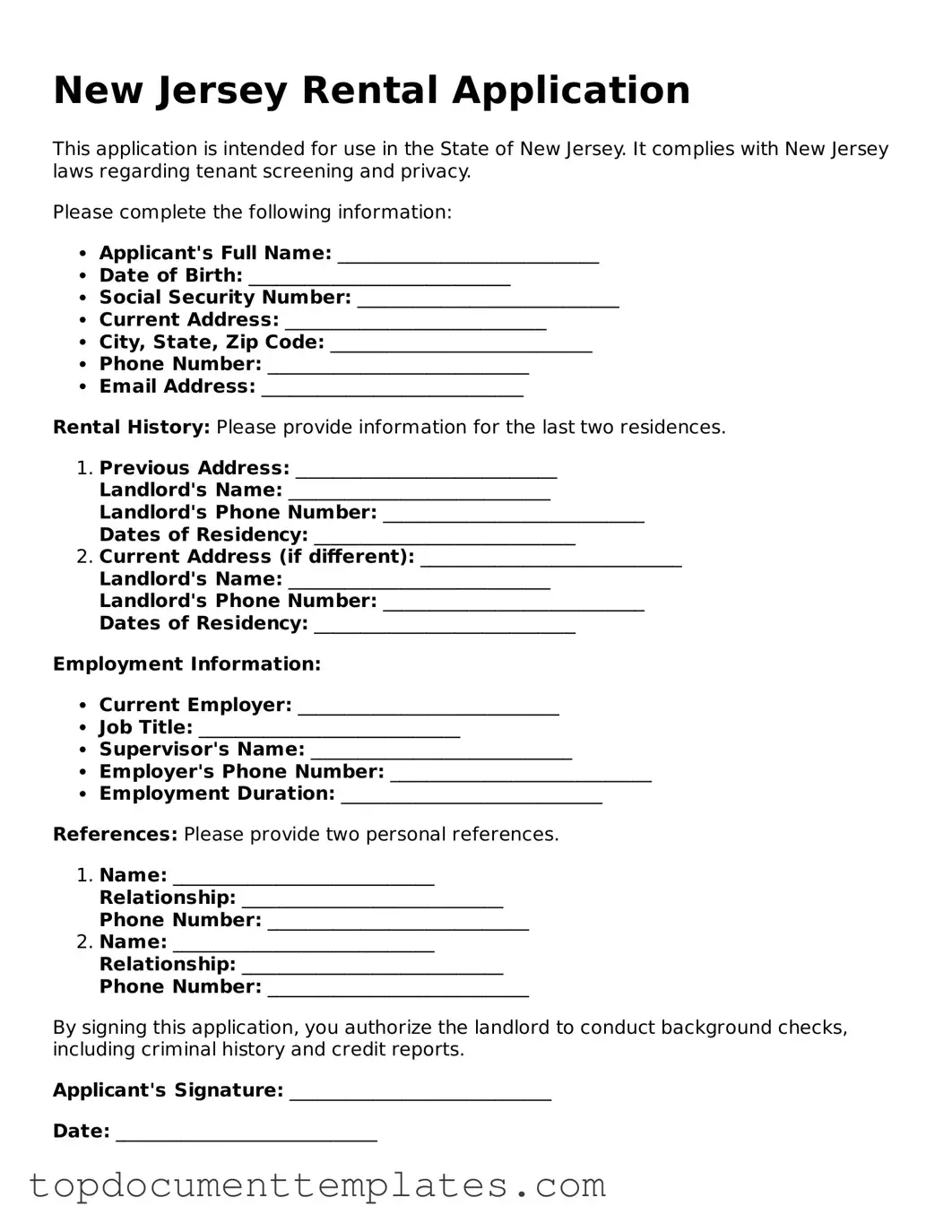Valid Rental Application Form for New Jersey State
The New Jersey Rental Application form is a crucial document for both landlords and prospective tenants. It serves as a tool for gathering essential information about applicants, ensuring that landlords can make informed decisions when selecting tenants. This form typically requests personal details, including the applicant's name, contact information, and social security number. Additionally, it often requires information about employment history, income, and references. By providing this information, applicants demonstrate their ability to pay rent and maintain a stable living situation. The application may also include questions about rental history, such as previous addresses and landlord contacts, allowing landlords to assess an applicant's reliability. Furthermore, many rental applications incorporate a consent section, where applicants authorize background and credit checks. This comprehensive approach helps create a transparent process, benefiting both parties involved in the rental agreement.
Similar forms
The Rental Application form is an important document used in the leasing process. It collects essential information from potential tenants. Several other documents share similarities with the Rental Application form in terms of purpose and the type of information they request. Below is a list of six documents that are comparable to the Rental Application form:
- Lease Agreement: Like the Rental Application, a lease agreement outlines the terms and conditions of renting a property. Both documents require personal information and details about the tenant's rental history.
- Credit Application: A credit application is similar in that it seeks financial information from the applicant. It often includes questions about income, debts, and credit history, which are also relevant in a rental application.
- Background Check Authorization: This document allows landlords to conduct background checks on potential tenants. It requests personal information and consent, similar to what is found in a rental application.
- Employment Verification Form: This form is used to confirm a tenant's employment status and income. It collects similar financial information, which is crucial for assessing a tenant's ability to pay rent.
- Rental History Verification: This document seeks information about a tenant's previous rental experiences. It is akin to the rental application in that it helps landlords gauge the reliability of the applicant.
-
A Motor Vehicle Bill of Sale is essential for documenting the sale of a vehicle in Illinois, providing proof of ownership. To learn more, you can visit https://documentonline.org/blank-illinois-motor-vehicle-bill-of-sale.
- Guarantor Application: If a tenant requires a guarantor, this application collects information about the guarantor's financial standing. It parallels the rental application by ensuring that all parties involved meet certain financial criteria.
Guidelines on Writing New Jersey Rental Application
Completing the New Jersey Rental Application form is an important step in securing a rental property. This form helps landlords assess potential tenants and gather necessary information for their decision-making process. To ensure a smooth application experience, follow the steps outlined below carefully.
- Begin by obtaining the rental application form from the landlord or property management company. This form may be available online or in person.
- Read the instructions provided with the application to understand any specific requirements or additional documents needed.
- Fill in your personal information, including your full name, current address, and contact information. Be sure to provide accurate details.
- Include your employment history. List your current employer, job title, and the duration of your employment. If applicable, provide details for previous employment as well.
- Disclose your income information. This may include your salary, bonuses, and any other sources of income. Landlords often require proof of income, so be prepared to provide documentation.
- Provide references. Typically, you will need to include contact information for previous landlords or personal references who can vouch for your reliability as a tenant.
- Complete any additional sections of the application, such as questions about pets, smoking preferences, or specific requests regarding the rental property.
- Review the application for any errors or missing information. Accuracy is crucial, as mistakes can delay the process.
- Sign and date the application. This indicates that you agree to the terms outlined in the form and that the information provided is truthful.
- Submit the completed application to the landlord or property management company, along with any required application fee and supporting documents.
File Information
| Fact Name | Description |
|---|---|
| Purpose | The New Jersey Rental Application form is used by landlords to screen potential tenants. It collects essential information to assess a tenant's suitability for renting a property. |
| Required Information | The form typically requires personal information, employment history, income details, and references. This information helps landlords make informed decisions. |
| Governing Law | The use of rental application forms in New Jersey is governed by the New Jersey Law Against Discrimination (N.J.S.A. 10:5-1 et seq.) and the New Jersey Consumer Fraud Act (N.J.S.A. 56:8-1 et seq.). |
| Application Fees | Landlords may charge a fee for processing rental applications, but this fee must be reasonable and disclosed upfront to applicants. |
| Tenant Rights | Applicants have the right to request a copy of the rental application and any background check results used in the decision-making process. |
Other Popular Rental Application State Forms
Rental Application Form Free - State the reason for leaving previous rentals for better understanding.
Blank Rental Application Form - Information on previous landlords can speed up your application.
When considering the importance of legal documentation, a Power of Attorney form in Texas serves as a vital instrument for ensuring that an individual's wishes are respected and executed effectively. By providing someone the authority to make decisions on their behalf, it safeguards their interests in various financial and medical situations. For invaluable resources and templates that assist in navigating this process, one can turn to TopTemplates.info.
Free Printable Rental Application Form - Include your phone number for communication purposes.
California Apartment Rental Application - State how you discovered the rental property or company.
